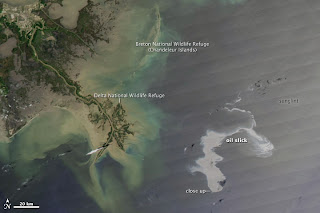Oil leak in Gulf worse than estimated, BP takes some responsibility

ABC News reports: With five times more oil leaking into the Gulf of Mexico than originally estimated and the price tag for last week's explosion predicted at $8 billion, questions about BP's response and level of responsibility are mounting.
Doug Suttles, the energy company's chief operating officer, admitted some responsibility for the disaster "because we're the lease holder," but assigning blame, he said, should come after the cleanup.
"I can tell you we're not worried about that right now," he said. "Who's ultimately responsible for what will come out over time through an investigations process."
The new leak estimate is about 5,000 barrels a day, according to the National Oceanic and Atmospheric Administration. Suttles told Good Morning America he still believes it to be between 1,000 barrels -- the company's original estimate -- and 5,000.
The Deepwater Horizon rigwas reportedly not equipped with a shutoff switch that could have been used to try to close the well. Such switches are not required in the United States, but are used in other countries such as Norway and Brazil.
Doug Suttles, the energy company's chief operating officer, admitted some responsibility for the disaster "because we're the lease holder," but assigning blame, he said, should come after the cleanup.
"I can tell you we're not worried about that right now," he said. "Who's ultimately responsible for what will come out over time through an investigations process."
The new leak estimate is about 5,000 barrels a day, according to the National Oceanic and Atmospheric Administration. Suttles told Good Morning America he still believes it to be between 1,000 barrels -- the company's original estimate -- and 5,000.
The Deepwater Horizon rigwas reportedly not equipped with a shutoff switch that could have been used to try to close the well. Such switches are not required in the United States, but are used in other countries such as Norway and Brazil.
Parts of the massive spill were lit on fire Wednesday as part of a controlled yet risky burn as a last resort to try and stop the oil slick from reaching the coastline.
"It's not a perfect solution," said Jackie Savitz Sr., campaign director for the Oceana Pollution Program. "It does increase air pollution and it can cause inhalation problems for marine life."



Comments